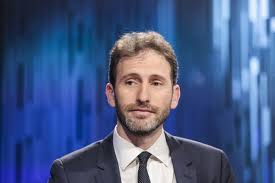M5S would ‘replace parliament with direct democracy’

ROME – Davide Casaleggio, one of the main political philosophers from Italy’s Five Star movement, has called for parliament to be abolished in favour of ‘direct democracy’ on the internet, which has led other parties to protest against signs of totalitarian tendencies.
Casaleggio, president of the Rousseau association, stated that “the overcoming of representational democracy is inevitable” and “it’s possible that within 5 years” Parliament “will not be necessary in this form”. These words, spoken in an interview with the Italian newspaper Verità, sparked protest from all oppositional parties; from right to left, from Forza Italia to the Pd (Democratic Party), to Liberi e Uguali.
According to the president of Pd Mattero Orfini, “firstly, everyone understands that there is not a single difference between authoritarianism within M5S and that of the law; better for the Italian left.”
Giorgio Mulè, deputy and spokesperson of the parliamentary groups within Forza Italia, more bluntly defined his words as “the most galactic rubbish”.
On the contrary, “delusion” is spoken of on the left; “A democracy without a parliament that represents its citizens is a dictatorship - maybe helped with the aid of the internet, but essentially still a dictatorship. As Sandro Pertini warned, democracy at its worst is always better than a dictatorship at its best.” These words were spoken by the head of the group of Liberi e Uguali, Federico Fornaro.
In an interview with Mario Giordano, Casaleggio continued that “today, thanks to the internet and to technology, more democratic and efficient participation methods exist in terms of popular representation of whatever twentieth century governmental model. The overcoming of representational government is inevitable.”
According to the president of the Casaleggio Association, “Parliament would exist and would exist with its most basis and important duty; to guarantee that the will of the people is transformed into concrete and coherent acts. Within five years its possible that it won’t be possible in this form.”
Also because, he underlined, there is a direct democracy that “is already a reality thanks to Rousseau; for the moment adopted by M5S whilst having the potential to be adopted in many other environments. That one vote is worth one vote is fundamental within a participative democracy. Great social changes can occur only by involving everyone through their participation as an individual and not on behalf of a proxy. We don’t need barons of intelligence that decide what should be done, but competent people in various circles of life that ask us what goals we want to go towards and that propose a route to achieve them. Incompetence is often an excuse for not letting people participate in important choices that concern them.”
Casaleggio’s line should be contextualised by two ministers of M5S of the Conte government, the Deputy Prime Minister Luigi di Maio and the minister that, not by accident, delegated him to the direct democracy, Riccardo Fraccero.
Di Maio said “The citizens have already told us that parliament is useless. Its up to us, with concrete acts, to prove the contrary.” According to the minister of relationships with parliament Fraccaro, “the thoughts of Casaleggio centre on a challenge that we have to face; to value parliament in light of a renewed purpose. We want to integrate the representation with direct democracy to return institutions to citizens. This is the objective of M5S.”
Regarding resistance to bureaucracy, he observes that “in one State affected by regular overproduction, it inevitably assumes a central role and often becomes a depository for an almost esoteric knowledge. There is a change underway that is unavoidable and will be invested in all social areas, public institutions included. Innovations such as blockchain will also revolutionise these sectors that will have to change and evolve. There is no alternative.”
Referring to the European Union, he claims it is “certainly a precious resource, but we need more participation methods. An example could be an obligatory popular referendum for the stratification of international treaties.” He labels the 3 percent ceiling in the relationship between deficit and GDP as “anachronistic” and notes that “Italy is a safe country. I believe that, as in everything in life, extremism must be avoided.”
cb


